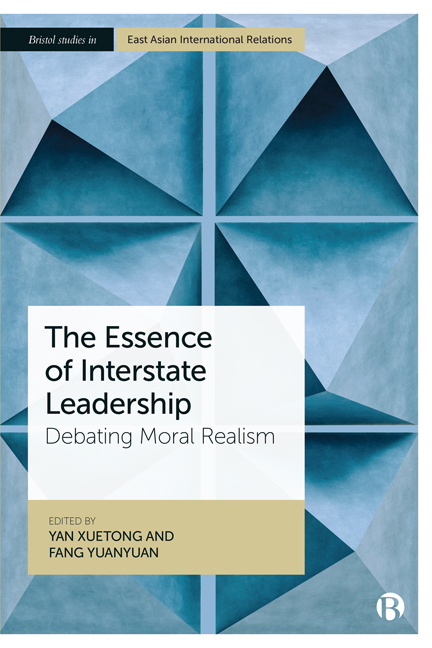Book contents
- Frontmatter
- Contents
- List of Abbreviations
- Notes on Contributors
- Preface
- 1 Interstate Leadership, Moral Realism, and their Critics
- 2 IR Moral Realism as a Universal Theory
- 3 Moral Realism as an Alternative Approach to the Agent-Structure Problem
- 4 Prospects, Promise, and Limitations of Moral Realism
- 5 Ideal Morality and Realist Interest of Moral Realism
- 6 The Conception of Morality in Moral Realism
- 7 Moral Realism and Hegemonic Transition
- 8 Innovation of Moral Realism and Dialogue with It
- 9 Moral Realism and Sino-American Relations
- 10 Moral Realism on Interstate Leadership in Response to Critics
- Appendix 1 Written Discussion between Rajesh Rajagopalan and Yan Xuetong
- Appendix 2 ‘Chinese School’ as an Inappropriate Title
- Selected Bibliography
- Index
6 - The Conception of Morality in Moral Realism
Published online by Cambridge University Press: 18 January 2024
- Frontmatter
- Contents
- List of Abbreviations
- Notes on Contributors
- Preface
- 1 Interstate Leadership, Moral Realism, and their Critics
- 2 IR Moral Realism as a Universal Theory
- 3 Moral Realism as an Alternative Approach to the Agent-Structure Problem
- 4 Prospects, Promise, and Limitations of Moral Realism
- 5 Ideal Morality and Realist Interest of Moral Realism
- 6 The Conception of Morality in Moral Realism
- 7 Moral Realism and Hegemonic Transition
- 8 Innovation of Moral Realism and Dialogue with It
- 9 Moral Realism and Sino-American Relations
- 10 Moral Realism on Interstate Leadership in Response to Critics
- Appendix 1 Written Discussion between Rajesh Rajagopalan and Yan Xuetong
- Appendix 2 ‘Chinese School’ as an Inappropriate Title
- Selected Bibliography
- Index
Summary
Professor Yan Xuetong's moral realism is one of the most distinctive and influential Chinese theories of international relations (IR) to have emerged in recent years. The theory was first presented in Ancient Chinese Thought, Modern Chinese Power. In a review article of that book, I suggested ‘moral realism’ to describe the theory. It was further developed in Leadership and the Rise of Great Powers, which tries to explain international power transition from the perspective of leadership quality.
Most IR scholars who come across moral realism for the first time will be more impressed by its enunciation of morality than by its account of realism. The moral element of the theory is derived from traditional Chinese thought, especially the insights of the ancient Confucian scholar Xunzi (298– 238 BCE). These are largely unknown outside the circle of professional philosophers and political theorists, let alone IR scholars. Yan's exploration of ancient Chinese thought for IR theory building was a novelty even inside China, not to mention in the West. His realism, in contrast, is largely a restatement of Western realist thought, especially classical realism.
But what precisely is the contribution of Yan's conception of morality to IR theory? In this chapter, I will explore the conception of morality in moral realism by situating it within broad intellectual approaches to morality. Drawing on moral philosophy across China and the West, I identify four approaches to morality that have dominated Western and Chinese intellectual history: deontology, consequentialism, virtue ethics, and role ethics. I then examine Yan's conception of morality by a close reading of his writings. Drawing on Xunzi, Yan distinguishes two levels of morality: humane authority, which has a strong moral standing, and hegemony, which is moral to the extent that it possesses strategic reliability. But he seems unaware of the two senses in which Xunzi conceives of morality: morality as duties and morality as virtues. He also misses Xunzi's relational conception of the morality of trustworthiness.
In the third section, I offer a critique of Yan's conception of morality. This conception is explicitly instrumental in accordance with realist commitments. It is narrow in that it is restricted to governmental morality judged by the extent to which policies serve national interests and capabilities. Subjects of genuine moral significance, such as justice and care, are left out of the picture.
- Type
- Chapter
- Information
- The Essence of Interstate LeadershipDebating Moral Realism, pp. 93 - 112Publisher: Bristol University PressPrint publication year: 2023



